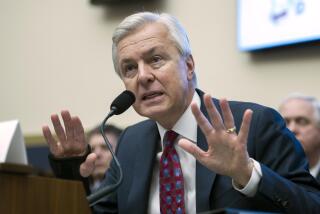SEC: Fannie Broke Accounting Rules
- Share via
Fannie Mae, the biggest source of money for U.S. home mortgages, broke accounting rules for financial contracts designed to protect against swings in interests rates, the Securities and Exchange Commission said Wednesday.
“Our review indicates that during the period under our review, from 2001 to mid-2004, Fannie Mae’s accounting practices did not comply in material respects with the accounting requirements,” SEC Chief Accountant Donald Nicolaisen said in a statement.
He said he advised Fannie Mae that it should restate financial statements filed with the SEC to eliminate the use of so-called hedge accounting.
The finding follows a September report by Fannie Mae’s regulator accusing the company of wrongly accounting for hedging transactions on its loan portfolio, using improper “cookie jar” reserves and deferring expenses in 1998 so executives could get their maximum bonuses.
Fannie Mae said Nov. 15 that if the SEC determined it didn’t qualify for hedge accounting, it would report a cumulative after-tax loss on its derivatives transactions of $9 billion as of Sept. 30, 2004.
Janice Daue, a spokeswoman for the Washington-based company, declined to immediately comment.
The SEC announcement was made after markets closed. Fannie Mae shares gained 30 cents to $70.69 on the New York Stock Exchange in regular trading.
Fannie Mae and rival Freddie Mac own or guarantee almost half the $7.6-trillion mortgage market. Congress created the publicly traded companies decades ago to expand homeownership by selling bonds and using the proceeds to acquire mortgages from banks.
The Office of Federal Housing Enterprise Oversight report in September also prompted a Justice Department investigation and pledges by Senate Banking Committee Chairman Richard Shelby of Alabama and other Republicans to revive legislation creating a tougher regulator for Fannie Mae and Freddie Mac.
The SEC chief accountant’s office is the final arbiter on whether companies’ accounting follows generally accepted principles.
Nicolaisen said in the statement that his decision on the accounting was separate from the agency’s enforcement probe of Fannie Mae. That investigation is continuing, he said.
More to Read
Inside the business of entertainment
The Wide Shot brings you news, analysis and insights on everything from streaming wars to production — and what it all means for the future.
You may occasionally receive promotional content from the Los Angeles Times.










